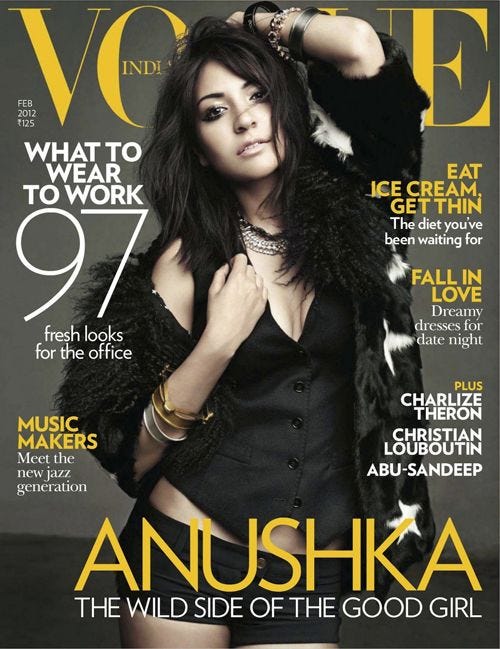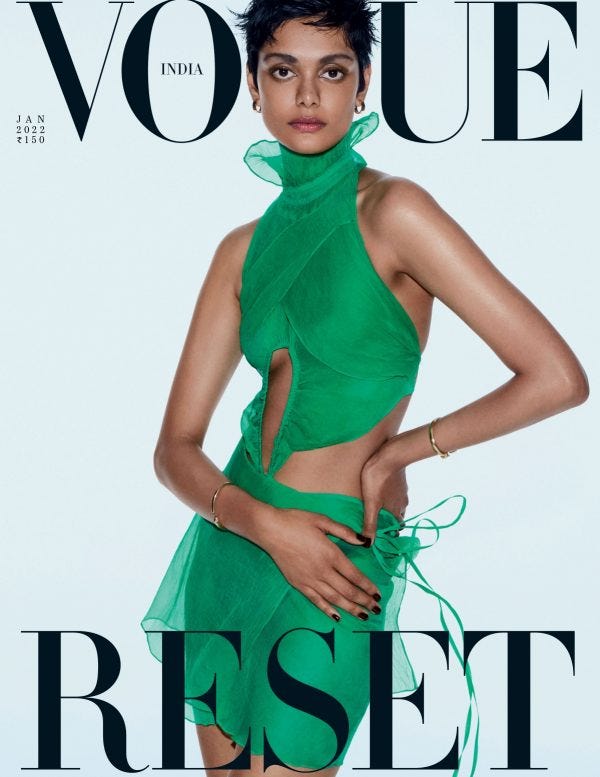Anna, please let it go!
mass layoffs, dwindling revenue, editors leaving in droves but amongst it all Anna Wintour persists.
In 2021, when Vogue India's longtime editor-in-chief (EIC) Priya Tanna announced her exit (almost simultaneously) with her fellow EICs from other Asian editions of Vogue, I had mixed feelings. On the one hand, I was fatigued by the lack of originality exhibited by Vogue India under Tanna's editorship — it didn't start that way, btw — and was eagerly looking forward to something new. On the other hand, the news of a more consolidated and homogenised 'content' across the board for all editions of Vogue raised some alarms. More than two years later, as the editorial content heads of both Vogue India (Megha Kapoor) and Vogue China (Margaret Zhang) announced their departure from the publications, I felt validated in my initial feelings of alarm and borderline fear.

As someone very well-acquainted with India's fashion landscape and culture (I was born and raised there), Megha's editorship for Vogue India was not received well, to say the least. I was intrigued when her first cover was released and had a relatively unknown model wearing an even more obscure designer (in the context of India); no disrespect to the London-based Supriya Lele. I thought to myself, what an excellent palate cleanser after years of uninspired covers that lowered the magazine's prestige and made no qualms about the 'will-do-just-about-anything-for-revenue' attitude of the leadership. Then, she started veering towards a territory that I should've seen coming but unfortunately didn't — she either went offbeat or failed to understand Indian fashion sensibilities or started overtly focusing on the Indian diaspora community.

Margaret Zhang shared a similar fate in China. For example, I remembered reading her profile on NYT a year ago. The criticism directed towards her by insiders in China felt eerily similar to the ones directed towards Kapoor in India. As per the critics, her version of Vogue China looked at the country through a Western lens instead of actually encapsulating its essence. She also coped with a lot of flack from industry veterans for an exclusivity contract she allegedly attached to the magazine's cover stars. Her usual response to the criticism was something relating to her age and people not taking her seriously because of it, which, if you have followed her career as extensively as I have, was pretty on-brand.
Zhang's work looked impressive (my favourite cover below), at least from the covers, and Kapoor's was better than it was made out to be. However, what does their failure to capture the zeitgeist in their respective countries say about Wintour's leadership? Since she was the one making these decisions from the get-go and giving these young creatives so much free rein in huge markets where they had minimal first-hand knowledge and connection. Or, what does it say about the magazine industry at large, especially in light of Edward Enninnful's recent departure, who arguably was the last reigning superstar EIC left at Condé Nast alongside Wintour.
If I had to examine Kapoor's work at Vogue India to paint a larger picture of Wintour's decision to consolidate content across all editions, I would say that this approach was just never going to work no matter which country it was or who was assigned as the editorial content head. In the case of India specifically, there are so many nuances and layers to the Fashion industry that I feel a magazine like Vogue — with so many stakeholders based overseas — will never be able to perfectly capture it. Perhaps where Tanna succeeded the most was positioning the magazine as a gateway to high fashion for the growing middle class of the country. That 'need' for a middleman to illustrate the beauty of fashion today, however, simply does not exist as the Indian customer has become highly fashion-savvy due to influences seen, shared and liked on social media.
Don't get me wrong, the culture of India could have been better captured by Vogue under Kapoor. However, the decline in revenue and relevancy, which ultimately must have triggered her exit, has more to do with the sinking ship that is the magazine industry and less with anything else she could've done in an alternate universe. So, where does that leave Vogue in India, China, and beyond? Honestly, I don't know. At this point, Anna is holding onto that sole EIC title as if her life depended on it, and she is throwing just about everything on the wall to see what sticks. For her sake, I hope something lands and lasts as long as she has.
Some other stories by me:



